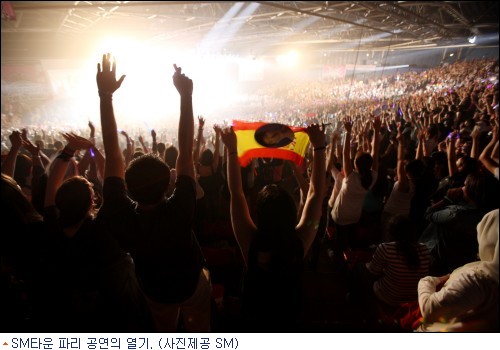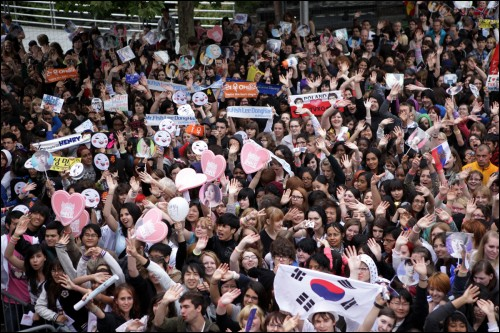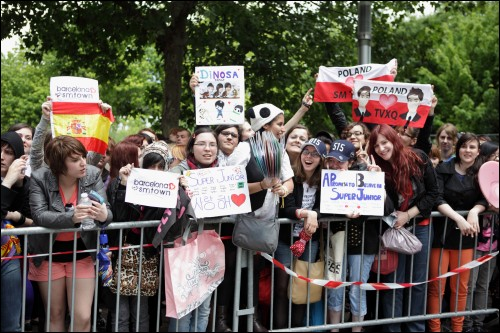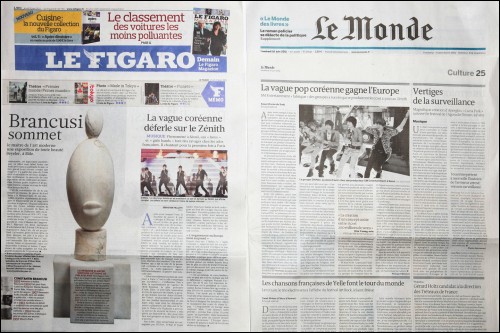An article of interest found at thejyjfiles
[TRANS] An Automatic Pardon for Lee Soo Man, the Originator of the European Korean Wave ‘Slave Contract’ [Fiasco]?
Posted on June 23, 2011 by The JYJ Files
Note: This article was originally posted on the first page of news portal sites. However, it suspiciously disappeared from the front page quickly after it was posted.
An Automatic Pardon for Lee Soo Man, the Originator of the European Korean Wave ‘Slave Contract’ [Fiasco]?
2011-06-21

[金土日의 리트윗] And if they buy it just because we export it?…the things that get buried under the hype about European expansion
The Korean Wave is tumultuous. Korean pop culture, which started rapidly spreading abroad in the late 1990s through TV dramas, to this day doesn’t show signs of slowing down. And now, through the Internet, Korean idol singers are even widening their stage all the way to Western Europe. This story was already reported by numerous media outlets, but the fine details were omitted. In any case, in summary, it was reported that even average European consumers were starting to respond to the musical products of the pop music business pioneered and executively directed by Lee Soo Man.

European Hallyu, a different and disorienting reality
The Korean Wave in Europe, for all the spotlight put on it in the 9 o’ clock news, is seen as a special case. ‘Ah, we [Koreans] have really become this admirable’, and this new impression seemed to not only be limited to SM Town but was spreading throughout Korea and even to far corners of the world. The most fitting phrase to describe this situation would be ‘a different and disorienting reality (격세지감(隔世之感)’.
In a way, the response came late. In the sports world, there have always been world-class stars. Kim Yuna, Park Taehwan, obviously Park Jisung, Park Chanho, Nam Hyunhee, Park Seri and others have shone on the world stage one after the other in a way similar to stars. And although the context is somewhat different this can also be said of our film directors like Park Chanwook, Bong Junho, Lee Changdong and Kim Kiduk who are acknowledged as world-class in their profession, renowned and have been central in raising awareness of Korean film, and consequently the pride of all involved in the film industry rose with them. And hey! Even the UN Secretary General is a Korean.

Popular Music that has fallen behind, the stigma of a copycat
Compared [to these other industries] the fuss that is the Korean Wave, in spite of the economic benefits it has brought our country, Korea’s popular music has not been able to give the sincere impression that its value has reached world-class levels up ‘til now. This is because its sphere of influence had not been able to extend beyond Asia, which always felt like an inadequate border. Perhaps this evaluation was coloured by prejudice centred on money, but if one considers the fact that there are countries that are much poorer both economically and culturally than Korea but whose music is known throughout the world it could be said with certainty that our country’s music in comparison to other areas had fallen behind in comparison.
On top of that, for a long time Korean pop music was branded with the stigma of being a ‘copycat’. This reputation came from the fact that almost all our musical genres from trot to rock and hip hop were all musical styles copied from elsewhere, and our history is full of such examples. In any case, wasn’t this a time when everyone was wearing jeans and suits? Instead of re-inventing foreign music in our way to fit with our pop music context we were quickly eager to copy continuously left and right, which consequently made it difficult to avoid plagiarism scandals and shake off the stigma associated with that. A lot of people held idols, dancers, lipsyncers responsible for the proliferation of this kind of knock-off music since they were the representatives and ambassadors for it. In particular, in the heyday of the illegal MP3 downloading controversy, a lot of netizens accused idol music of being, simply put, “rubbish” and, going further, “only the title track is worth paying for and the rest is rubbish”.

Enthusiasm on the mainland, an excessively strange spectacle
In these circumstances, where the very Western societies that had solidified the notion that Kpop was nothing more than a product of plagiarism and knockoffs was all of a sudden enthusiastically forming crowds to listen to Korean pop music…this image was indeed powerful and effective. This was on the scale of a dramatic human documentary story of an elite restaurant owner who had started out as a poor delivery boy. On top of that, the central figure that had brought this about was not a top-quality rocker or true musician but the knockoff-stigma-ridden idol, dancer, lipsyncer. There couldn’t have been a bigger irony.
In addition to the 9 o’ clock news, the majority of the media were singing with one voice in praise and admiration for the Korean Wave in Europe. This doesn’t mean that there aren’t voices both without and outside of Korea raised in criticism, but there voices were made feeble and difficult to hear. In the midst of these developments and in conformity with them, people began to suddenly re-evaluate the idols, dancers, lipsyncers at the centre of the Korean Wave in Europe and change their position with regards to Lee Soo Man, praising him. It appears there are even calls from sincere people to re-evaluate [Lee] as an innovative entrepreneur.

Lee Soo Man in the limelight, a futile generation
However, not everyone deserves a “re-evaluation”. It would be applied to people who, due to the limits of their time, had to make difficult decisions in order to reverse the polluted reputation of their line of work, but after a long time passes it becomes clear that their actions brought about a positive future in the end. In the case of Lee Soo Man, it’s obvious that he was able to reverse the polluted name of Korea’s music industry, but there’s still a long way to go before one can say that what he did was to overcome some dark aspect or that he assumed the role of the bad guy in order to bring about a brighter future. He only assumed the role of the bad guy for his own monetary ambitions and reputation, and the result of that is precisely the 21st century Korean pop music industry structure proliferated through TV and variety programmes and centred around idols, dancers, lipsyncers.
Lee Soo Man is the representative figure of this industry that has solidified the presence of the “slave contract” by taking advantage of adolescents chasing their dreams. Dong Bang Shin Ki, H.O.T and other star-quality groups that he shared joys and sorrows with, he has put through legal conflicts and dirty and painful separation sagas. Even where the law has taken care of the separation, to him there is no such thing as coolly letting go. Mobilising every means that he could mobilize, he has chased them down to annihilate them with methods so low that they are like those of alleyway thugs.
People all over the world are sure to remember his deeds from the past. Such deeds, he perpetrated not once or twice and given their scale in severity they have been special features in the media; people are bound to remember. And so, what is with this sudden forgiving public mood toward him just because he claims to be an important exporting mainstay? This too is an incredible case of “different and disorienting reality.
金土日 동네뮤지션(449PROJECT) media@mediatoday.co.kr
<저작권자(c)미디어오늘(www.mediatoday.co.kr)>
Source: Media Today
Translation credit: Jimmie of TheJYJFiles
Just some reposts courtesy of the fans at thejyjfiles Thank you.
Brin says:
June 23, 2011 at 11:05 am
The popularity of idol groups overseas is as much due to devoted fans posting, translating, and promoting the artists as it is Lee Soo Man. He may have started these groups, but he would not be able to send them to Europe if their fans had not spent such a significant amount of time making sure their beloved idols were better known. Lee Soo Man is only a part of the equation, he should not be getting all the credit. He may have given the artists a chance but they still sweat and bled for it, and the fans stood behind them. I hope Korea remembers that individuals are just as important, if not more so, as recognition.
Reply
roxie says:
July 1, 2011 at 5:29 am
exactly what I was thinking !!!
it ‘s mainly because of a group in facebook which gathered almost 8000 people that smtown was held in paris, not because of Lee Soo Man at all !!!
The fans were in Europe before he even cared about the european hallyu !
Reply
Shhh says:
July 16, 2011 at 3:55 am
Totally agree.
Reply
shuheilove says:
July 15, 2011 at 2:14 am
Well I think the most important thing we have to be awared of is that Lee Soo Man is a man who has achieved recognition due to the artists he has trained and promoted having them under slave contracts, profiting on their work in an scandalously barefaced way.
Momma’s Source: thejyjfiles
Share This
